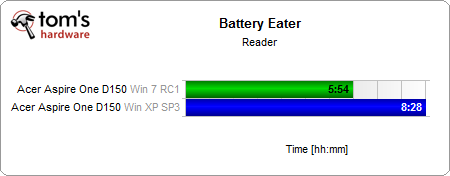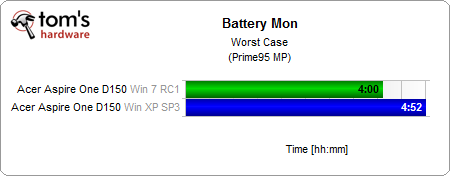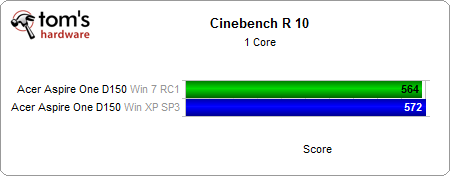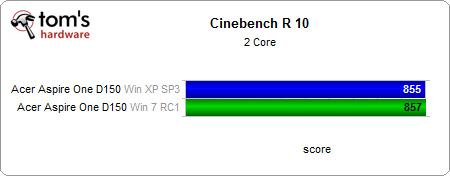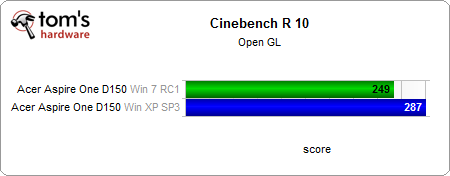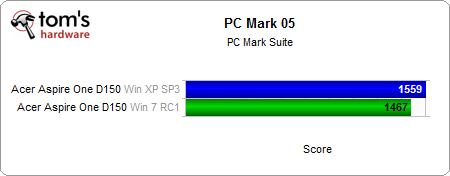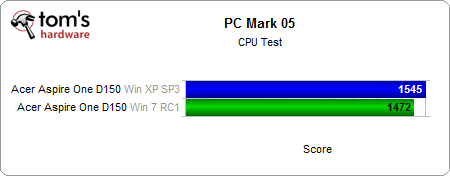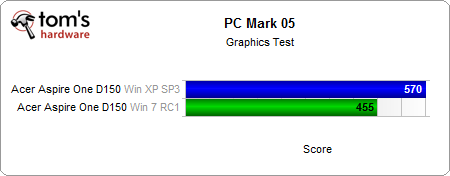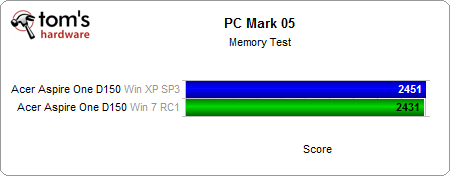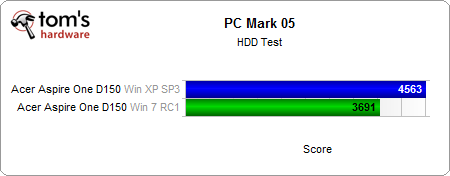Windows 7 Versus XP: Which Belongs On Your Netbook?
Battery Life And Synthetic Benchmarks
Battery Life
Of course, no review of a netbook platform is complete without a look at battery life, especially if we’re interested in the differences between OS versions. However, we shouldn’t forget that we’re still dealing with a release candidate of Windows 7, which means that both the operating system itself and its drivers are still very much works in progress. As previously mentioned, we decided to run our tests using the latest Intel drivers for Windows Vista. It is possible and even likely that native Windows 7 drivers will allow for longer battery life. We certainly hope so, since Windows 7 looks decidedly bad in this discipline. Idle runtime, simulated with Battery Eater’s Reader test, is shortened by 2.5 hours by moving to the newer OS. That’s unacceptable for a mobile platform.
Cinebench R10
We begin our benchmark analysis with Cinebench. Its CPU test determines the processing power of the CPU and puts as many cores to work in the x-Core run as are available. In the case of Intel’s Atom processor, that means that it uses the two threads provided by Hyper-Threading. Scores are nearly identical across the two OS versions.
As the name implies, the OpenGL test focuses on graphics performance. This is where we initially stumbled across the lackluster performance resulting from Microsoft’s drivers, which lagged behind with a two-digit score. Switching to Intel’s latest Vista driver boosted performance almost tenfold, but Win 7 still couldn’t catch up with XP.
PCMark 05
PCMark 2005 clearly favors Windows XP. The more modern operating system is unable to best its eight year old predecessor in even a single subtest, although results are sometimes quite close. Graphics and hard drive performance show the largest performance deltas. Again, all we can say is that more optimized drivers should improve performance to some extent, providing Intel invests the time and actually releases them.
Get Tom's Hardware's best news and in-depth reviews, straight to your inbox.
Current page: Battery Life And Synthetic Benchmarks
Prev Page Test Hardware And Notes Next Page Application Benchmarks-
apache_lives LMAO just as i thought - its a vista renamed and flashed up a bit moreReply
i know - BUY MORE RAM - just might help a little? who knew! -
duckmanx88 apache_livesLMAO just as i thought - its a vista renamed and flashed up a bit morei know - BUY MORE RAM - just might help a little? who knew!Reply
did you even read the article? look at the results. read Benjamin's conclusion. its the moder interface of vista with the functionality of xp. and this is only an RC. who knows what'll happen until the October release. -
l0st_ins0mniac vista sucked ill stick with my xp 02 and 05 till i hear a bit more about win 07Reply -
mitch074 personally, I've found the solution:Reply
neither. I'm a running a Tux on me netbook. I pity da foo' running either da decrepit or da unwashed behind da ears OSes on them netbooks. -
harshavardhanr Windows RC1 installs the ULTIMATE edition by default whereas netbooks that come installed with Windows 7 will have the STARTER edition installed. The Starter edition should be able to perform better and last longer on netbooks because it is (supposedly) optimized for them. Also, it will have far fewer services running in the background compared to the Ultimate edition.Reply
Hence, the conclusion, THE ABOVE COMPARISON IS POINTLESS. -
bigdaddycool Windows 7 is much improved on Vista. Using Vista on a laptop is ok if you have enough cpu power/ram mostly to back it up.Reply
Windows 7 on the other hand in a real world test, say opening up like 10 internet explorers, photoshop and other things....... windows 7 will be alot snappier then Vista, also it uses less ram and less gpu power.
Ontop of that, by default Windows 7 selects the most appropriate power setting for the processor you are using.
Take notice, low-mid range cpu's will be set to Balanced, where as high performance cpu's like quad cores will be set to High Performance by default.
Microsoft took Vista (good gui product a lil run down running wise) and for a better word tweaked it out...... much like tuning a car.
The result is impressive I say for notebook and desktops. However, they really do need to fix their minor network issues and IE8 issues. -
YGDRASSIL Ultimate edition on a netbook and then complain about battery life. Hmmmm. Tommy is really losing it now. Wonder why I still come back here after the old good Tommy was brutally murdered.Reply -
Inneandar It would be nice to see some more 'practical' benchmarks like boot time, app launch times or media playback preformance imho... The conclusion already more or less indicates that win7 felt smooth, but this ain't something you're gonna prove running synthetics. I installed win7 recently on an old laptop (p IV, 512 Mb ram!) and to my opinion it is smoother than the xp previously on it (older install, admittedly). Together with the added functionality, this certainly tips the balance for me.Reply -
pbrigido Very good article! I was wondering with regards to the battery life difference between Win 7 and XP if all settings were set to a similar mode. The huge difference between the two OSs seems to be much larger than it should, even without the most current drivers for 7.Reply
